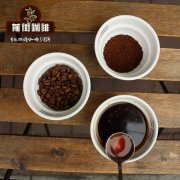How about Honduran coffee development under the impact of the epidemic? 2020 Honduran coffee quality assessment

Honduras is a small Central American country with many problems. The World Bank estimates that 20% of Honduras's income in rural areas is less than $1.90 a day. Nationwide, roads are not ideal; many coffee farms in Honduras can only be accessed by winding dirt roads along hillsides. Despite these factors, entrepreneurial coffee producers in Honduras are still trying to improve quality, experimenting with new processing technologies and growing high-specification varieties. Goal: to open the door to the special coffee market, build a reputation as a special coffee producing area, and earn the money that follows.
Honduras is the world's sixth largest producer of Arabica coffee, providing 700 million pounds of coffee a year. However, the coffee trade in Honduras is dominated by middlemen who do not necessarily care about quality or pay farmers fairly.
Molinos, Honduras.
True Origin buys all its Honduran coffee through its sister company, Molinos. Molinos has offices and factories in Comayagua,El Paraiso,Santa Rosa,Vallecillos,San Nicolas,Pena Blanca and Subirana, and Molinos can take the pulse of Honduran coffee.
Honduras is traditionally an intermediary. Middlemen make life easier for exporters, but usually give less money to farmers. In 2014, Molinos made a strategic decision to work directly with farmers and mediate. In five years, Molinos has gone from direct procurement of 5 per cent to direct procurement of 80 per cent, cooperative cooperation of 15 per cent and 5 per cent from selected intermediaries that are consistent with Molinos's purchasing strategy. In the end, Molinos worked directly with more than 8000 small manufacturers! It is much more difficult to work with so many farmers, but it brings Molinos face to face with suppliers. Working directly with producers also enables Molinos to help farmers produce higher quality coffee and, most importantly, to help farmers get higher pay.
National coffee production in Honduras has been increased and increased nationwide, but the last two years have been fraught with challenges. The huge price pressure keeps many farmers away from coffee production. Some people give up their farms completely. As the pressure of new immigrants from the United States continues to spread, there is a shortage of immigrant coffee pickers from neighboring countries such as Nicaragua. This effect means that cherries dry on coffee trees. The decline in production has had a huge market impact, that is, a decline in output and quality.
Molinos expects to continue to reduce production by 2021. In addition, they believe that the country's internal pricing will make the procurement of quality coffee more competitive and difficult. As a result, Molinos's earlier strategic shift was to work directly with producers, which should give it a procurement advantage over other exporters.
Boutique coffee farm
The reality of Honduran farmers is worrying. There are many market factors that complicate farmers' affairs. Low prices and lack of pickers cause coffee to dry on the trees, and changes in climatic conditions make coffee cherries fall from the trees. Transport is another problem area. Most Honduran coffee farms are located in the mountains, and the roads are not ideal.
But Honduras is not without success stories. Angel Ramos began growing coffee on a piece of land he bought from his mother 20 years ago. His parents and grandparents taught him how to work in a coffee shop.
Angel began selling coffee to Molinos in the 2014 Mel 2015 crop year. Since then, he has seen his profits increase. He now owns six hectares of land and plans to buy another two hectares.
Other farmers, such as Jos é Noel Mendes (Jose Noel Mendez), have benefited from cooperation with the Volcafe Way and Molinos solar dryer projects. Jose Farm, La Casa and La Chorrera have solar dryers and desizing systems, which enable him to provide fully ground coffee and get paid more.
Jose Noel (Jose Noel) can improve productivity and profitability, thanks in part to the agricultural and technical support provided by Volcafe Way.
Grow more specialty coffee in Honduras
Honduras has the potential to become the birthplace of specialty coffee, but it also faces many challenges. Molinos sees processes such as wet grinding and drying as areas for improvement. In the Komayagua and Paraiso regions, ideal climatic conditions and yields show the potential to produce large quantities of high-quality specialty coffee. However, processing capacity is still an obstacle. Compared with producers in the west (such as Copan,Intibuca,La Paz,Lempira and Ocotepeque), farmers in these emerging areas need to catch up in terms of organization. These budding sectors have not yet begun to establish cooperatives, which will provide ways to centralize milling, drying, technical assistance and business opportunities.
Molinos is committed to joining these traditional producers to help them develop and become a large-scale sustainable coffee specialty supply chain.
The trend of specialty coffee market in Honduras
Around the world, coffee buyers are becoming more sophisticated. Roasters require high-end coffee and innovative technologies to improve flavor. They want their coffee to be consistently tasty and traceable. Providing the same quality coffee year after year is one of the keys to positioning yourself in the professional market.
Fortunately, Honduras has high-quality coffee and plenty of coffee. There is more potential! However, to be able to get coffee, you must be able to maintain complete traceability. Over the past five years, Molinos has worked directly with farmers and reduced intermediaries. They are surprised by the quality they can get from communities, farms, and even individual producers.
Molinos is seeing more and more producers and cooperatives experimenting with coffee made from natural coffee and honey. They also see some medium-sized manufacturers experimenting with anaerobic and yeast-based processes. Growers are also expanding their varieties, including Gesha,Pacamara and Parainema. These processes are still in the development stage and will not be immediately available in "large quantities".... But it's coming. Farmers are innovating; they want to enter more selective markets and get better prices.
Real Origin Coffee and Coffee quality in 2020
The first batch of coffee of true origin was the Honduran community batch and the micro batch. Many of the Pacavita and Guamadanta have proved to be consistent in flavor, quality and quantity. These Honduran specialty coffees have become the main force in the baking industry in the United States. Maintain continuous contact with Pacavita and Guama Danta producers and cooperatives to enable Molinos to consistently provide quality coffee. Molinos is also pleased to establish a new partnership with the International Women's Coffee Federation (IWCA). Together, they will provide 100% coffee produced by women farmers to authentic coffee.
Several regions of Honduras have unique microclimate and growth conditions that can produce unique coffee characteristics. For example, the western region of Honduras (Copan, Intibuca, Ocotepeque) is balanced, usually healthy and fruity. In the central part of the country where Comayagua and Francesco Moraz á n are located, specialty coffee usually has more acidity, citric acid and exciting floral aromas.
Due to many of the challenges mentioned above, this year Molinos's quality control team must work harder to achieve the iconic Pacavita and Guama Danta flavor features. After a large number of cupping and mixing, they reached the quality required by authentic origin.
Genuine Origin's team of Q raters rated the 2020 Guama Danta as floral and fruity, chocolate, medium-bodied and slightly more acidic. Fresh Pacavita organically provides excellent balance of chocolate, caramel and sucrose taste with body and acidity.
Molinos is still developing IWCA parcels. The aim is to continue to innovate, bring exciting coffee to the authentic country of origin and its roaster community, improve the status of origin, and continue to promote Honduran specialty coffee
Important Notice :
前街咖啡 FrontStreet Coffee has moved to new addredd:
FrontStreet Coffee Address: 315,Donghua East Road,GuangZhou
Tel:020 38364473
- Prev

In the first match of Ethiopia, COB got a good score of more than 90 points with three beans in the first match.
Despite the economic, social and logistical disruptions in the past few months, the first-ever Ethiopian Cup of Excellence was the first winner. The 28 winning coffees, including the top three with more than 90 points, will be auctioned online on June 25. Although all award-winning coffee growers can celebrate this achievement, through the Ethiopian Coffee and Tea Authority
- Next

The result of the 16th Nicaragua Excellence Cup in 2020 is announced. When will the auction of COE start?
Portland, Oregon (June 5, 2020)-the Coffee Excellence Alliance announced the winning Coffee at the 16th Outstanding Cup in Nicaragua. Nicaragua's winning cup returned to the country after an one-year truce, providing a total of 249 cups of coffee (of which 74% were produced for the first time). At this year's Expo, 17 cups of coffee won the Outstanding Cup, and 12 cups of coffee were awarded the national championship. Have to
Related
- What is the difference between Indonesian Sumatra Mantinin coffee and gold Mantinin? How to distinguish between real and fake golden Mantelin coffee?
- What does bypass mean in coffee? Why can hand-brewed coffee and water make it better?
- Unexpected! Ruixing Telunsu lattes use a smoothie machine to foam milk?!
- % Arabia's first store in Henan opens into the village?! Netizen: Thought it was P's
- Does an authentic standard mocha coffee recipe use chocolate sauce or powder? Mocha Latte/Dirty Coffee/Salty Mocha Coffee Recipe Share!
- What is the difference between Vietnam egg coffee and Norway egg coffee? Hand-brewed single product coffee filter paper filter cloth filter flat solution!
- What is the difference between sun-cured and honey-treated coffee? What are the differences in the flavor characteristics of sun-honey coffee?
- How to make Italian latte! How much milk does a standard latte use/what should the ratio of coffee to milk be?
- How to make butter American/butter latte/butter Dirty coffee? Is hand-brewed coffee good with butter?
- Is Dirty the cold version of Australian White? What is the difference between dirty coffee/decent coffee and Australian white espresso?

